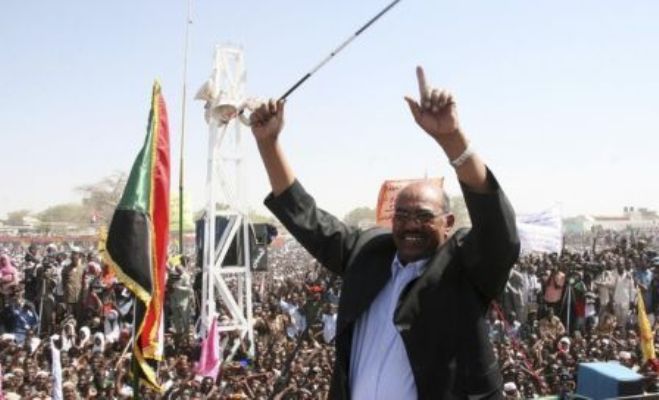Sudan’s Bashir says civil disobedience was “one million percent failure”

November 29, 2016 (KHARTOUM) – Sudanese President Omer al-Bashir said the civil disobedience act that took place in his country during the past three days was a complete failure.
Large segments of the Sudanese people have engaged in a three-day civil disobedience act from 27 to 29 November to protest the recent austerity measures and the lack of freedoms.
In an interview with the UAE-based Al Khaleej newspaper on Tuesday, al-Bashir said the recent civil disobedience was a “one million percent failure”, pointing that all residents were keen to go to their workplaces.
“Employee attendance rate was high last Sunday,” he said.
However, al-Bashir acknowledged the rising prices of commodities due to recent austerity measures, saying the move was like a “slap in the face” for the Sudanese citizen.
The Sudanese president described the price list of drugs issued by the former secretary general of the Sudan Pharmacy Council (SPC) Mohamed Hassan Imam as an “error by the competent entities”.
Earlier this month, Central Bank of Sudan (CBoS) announced it will no longer provide US dollar for drug importation at rate of 7,5 Sudanese pounds (SDG) forcing pharmaceutical companies to buy the dollar from the black market at 17,5 pounds.
Following the CBoS’s decision, the SPC issued a new list showing the drug price has drastically increased by 100 to 300 percent.
The decision stirred a large wave of protests across Sudan forcing al-Bashir to sack Imam and cancel the new list of drug price.
Al-Bashir pointed that the economic reform program was necessary especially after the secession of South Sudan, saying the economic situation is improving and the inflation fell to 13% from 60%.
Sudan’s economy was hit hard since the southern part of the country declared independence in July 2011, taking with it about 75% of the country’s oil output.
Meanwhile, al-Bashir said a new government of national concord will be formed following the approval of the proposed constitutional amendments in the parliament.
TIES WITH WASHINGTON
Regarding Sudan’s relations with the United States, al-Bashir said he is “convinced that dealing with President-elect Donald Trump will be a lot easier than dealing with others, because he is a straightforward person”.
“He [Trump] focuses on the interests of the American citizen unlike those who used to speak about transparency, democracy and human rights. He is a businessman who seeks to achieve interests and it would be clear and easy to deal with him,” al-Bashir said.
Washington imposed economic and trade sanctions on Sudan in 1997 in response to its alleged connection to terror networks and human rights abuses. In 2007 it strengthened the embargo, citing abuses in Darfur which it labelled as genocide.
Also, Sudan has been on the US list of countries supporting terrorism since 1993, for allegedly providing support and safe haven for terrorist groups.
Sudan says Washington didn’t honour its pledges to lift Sudan from the United States list of state sponsors of terrorism after the independence of South Sudan and kept sanctions for political reasons.
But Washington says Khartoum has to end the armed conflict in South Darfur and Blue Nile states and to settle Darfur crisis.
FIGHTING AGAINST ILLEGAL MIGRATION
The Sudanese President further said his country is making significant efforts to combat terrorism and illegal migration on the borders with Libya, pointing they deployed more than 1000 four-wheel drive “Land Cruiser” vehicles along the border to fight against human trafficking.
Sudan is considered as a country of origin and transit for the illegal migration and human trafficking. Thousands of people from Eritrea and Ethiopia are monthly crossing the border into the Sudanese territories on their way to Europe through Libya or Egypt.
The European Union (EU) said it cooperates with the Sudanese government on projects to tackle the root causes of migration, pointing these “ projects contribute to improving livelihoods, stimulating youth employment, and supporting basic services for refugees, the displaced, and host communities”.
Earlier this year, the EU granted a €100m development package to address the root causes of irregular migration in Sudan. The financial support came after pledge by the Sudanese government to cooperate with Brussels to stop human trafficking to Europe.
Also, in June 2014 the US Department of State hailed Sudan’s efforts in containing and fighting against human trafficking.
Last June, a joint operation among Sudan, Italy and the United Kingdom has led to the arrest of an Eritrean man suspected of controlling one of the world’s four largest criminal migrant trafficking organizations.
(ST)
